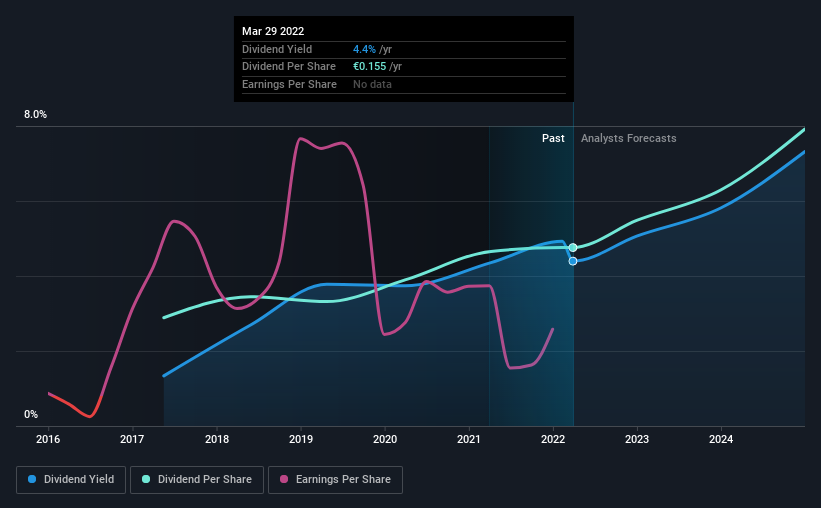
The board of LeoVegas AB (publ) (STO:LEO) has announced that it will be increasing its dividend on the 27th of May to kr0.42. This will take the dividend yield from 4.4% to 4.4%, providing a nice boost to shareholder returns.
See our latest analysis for LeoVegas
LeoVegas Doesn't Earn Enough To Cover Its Payments
If the payments aren't sustainable, a high yield for a few years won't matter that much. Prior to this announcement, the company was paying out 147% of what it was earning, however the dividend was quite comfortably covered by free cash flows at a cash payout ratio of only 50%. Generally, we think cash is more important than accounting measures of profit, so with the cash flows easily covering the dividend, we don't think there is much reason to worry.
The next 12 months is set to see EPS grow by 153.8%. However, if the dividend continues growing along recent trends, it could start putting pressure on the balance sheet with the payout ratio getting very high over the next year.

LeoVegas Doesn't Have A Long Payment History
The dividend's track record has been pretty solid, but with only 5 years of history we want to see a few more years of history before making any solid conclusions. Since 2017, the dividend has gone from €0.094 to €0.15. This implies that the company grew its distributions at a yearly rate of about 11% over that duration. It is always nice to see strong dividend growth, but with such a short payment history we wouldn't be inclined to rely on it until a longer track record can be developed.
Dividend Growth May Be Hard To Achieve
Some investors will be chomping at the bit to buy some of the company's stock based on its dividend history. However, initial appearances might be deceiving. It's not great to see that LeoVegas' earnings per share has fallen at approximately 4.9% per year over the past five years. Declining earnings will inevitably lead to the company paying a lower dividend in line with lower profits. However, the next year is actually looking up, with earnings set to rise. We would just wait until it becomes a pattern before getting too excited.
LeoVegas' Dividend Doesn't Look Sustainable
In summary, while it's always good to see the dividend being raised, we don't think LeoVegas' payments are rock solid. In the past, the payments have been unstable, but over the short term the dividend could be reliable, with the company generating enough cash to cover it. Overall, we don't think this company has the makings of a good income stock.
Investors generally tend to favour companies with a consistent, stable dividend policy as opposed to those operating an irregular one. Meanwhile, despite the importance of dividend payments, they are not the only factors our readers should know when assessing a company. As an example, we've identified 2 warning signs for LeoVegas that you should be aware of before investing. If you are a dividend investor, you might also want to look at our curated list of high yield dividend stocks.
New: AI Stock Screener & Alerts
Our new AI Stock Screener scans the market every day to uncover opportunities.
• Dividend Powerhouses (3%+ Yield)
• Undervalued Small Caps with Insider Buying
• High growth Tech and AI Companies
Or build your own from over 50 metrics.
Have feedback on this article? Concerned about the content? Get in touch with us directly. Alternatively, email editorial-team (at) simplywallst.com.
This article by Simply Wall St is general in nature. We provide commentary based on historical data and analyst forecasts only using an unbiased methodology and our articles are not intended to be financial advice. It does not constitute a recommendation to buy or sell any stock, and does not take account of your objectives, or your financial situation. We aim to bring you long-term focused analysis driven by fundamental data. Note that our analysis may not factor in the latest price-sensitive company announcements or qualitative material. Simply Wall St has no position in any stocks mentioned.
About OM:LEO
LeoVegas
LeoVegas AB (publ) operates as a mobile gaming company in Malta, Sweden, and internationally.
Adequate balance sheet low.
Similar Companies
Market Insights
Community Narratives



